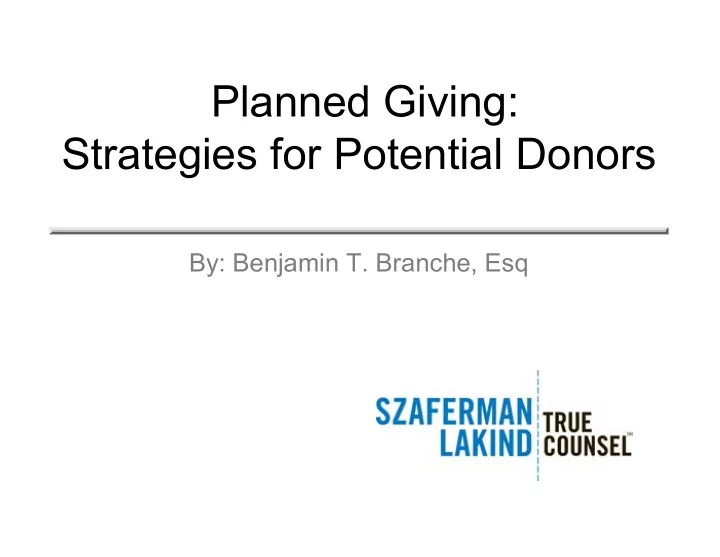

Planned Giving: Strategies for Potential Donors By: Benjamin T. Branche, Esq
What is Planned Giving? ▪ A method of giving that enables philanthropic individuals to make larger gifts than they may based on their annual income. ▪ A major gift (during life or at death) as part of the donor’s overall financial and/or estate planning. ▪ A way to leave a lasting impact. ▪ Sometimes known as “deferred giving”.
Four Typical Giving Strategies ▪ Give the asset now ▪ Give the asset at death ▪ Give the asset, but keep the income ▪ Give the income, keep the asset
Know Your Donors ▪ Age 55+ ▪ Long-time member/supporter ▪ Few or no dependents ▪ Regular generosity or involvement in your organization ▪ Appreciated assets/high income
Why do Donors Give? Why give: • To help the organization. • Ability to restrict funds. • Save taxes. • Recognize a loved one or organization that supported them or their loved ones.
When do Donors Give? When they give: • When doing estate planning. • Shortly after services have been provided to individual or loved ones. • When circumstances have created the opportunity. • Donor has a reason to support your organization.
Cash Gifts •Appropriate for: Everyone •Tax Treatment: Fully deductible if itemize deductions (up to 50% of adjusted gross income (AGI)), with 5 year carry forward for unused portion. • Potential issues: Deduction is phased out for high income tax payers.
Appreciated Assets •Appropriate for: Those with appreciated securities, real estate or closely held stock. •Tax Treatment: Fair market value is deductible (up to 30% of AGI), with 5 year carry forward for unused portion. •Potential issues: Gift must be made prior to sale, or net proceeds deemed cash donation.
Noncash Charitable Contributions •Appropriate for: Anyone wishing to donate real or personal property (artwork collectibles, vehicles, farms, livestock, etc.) •Tax Treatment: Deductible up to appraised value (form 8283 is filed with return). If an asset has a value greater than $5,000, an appraisal must be obtained. •Potential issues: Deduction recaptured if asset sold within 3 years of donation.
Charitable Gift Annuities ▪ Appropriate for: Those wishing to retain some benefits, yet receive a charitable deduction. ▪ Tax Treatment: Charitable deduction determined based on retained interest of donor based on life expectancy. ▪ Potential Issues: Assets must be segregated and income ends when donor dies or attains life expectancy.
Bequests and Devises •Appropriate for: Everyone •Tax Treatment: Bequests and devises excluded from estate for estate and inheritance tax purposes. •Potential issues: Gifts must be to qualified charities.
Pooled Income Fund ▪ A trust established and maintained by the public charity to which donor’s funds are commingled for investment purposes. ▪ Funds’ entire net income is distributed to the participants according to participation. ▪ After death of participant, funds may be used by charity for its purpose.
Pooled Income Fund Con’t ▪ Appropriate for: Those who desire higher rate of return and income, but do not have the assets for Charitable Gift Annuity ▪ Tax Treatment: Current income tax deduction received for portion of gift based on life expectancy of donor. No capital gain on transfer of assets. ▪ Potential Issues: Restrictions on investment opportunities in pool
Life Insurance ▪ Appropriate for: People with policies in place, but such policies are no longer necessary to meet estate planning needs. Those who do not have the assets available during life, but want to leave a greater amount at death to their charity. ▪ Tax Treatment: Current deductions for payments of premium or “cash surrender” value. ▪ Potential Issues: Charity must be an “insurable interest”
Charitable Remainder Trusts ▪ Appropriate for: Individuals with large taxable estates wishing to preserve an income stream to someone for life or term of years with remainder passing to organization. ▪ Tax Treatment: Charitable deduction based on term of the life interest and percentage passing to income beneficiaries. ▪ Potential Issues: Trusts are considered separate taxpayers and must be managed and invested carefully.
Charitable Lead Trusts ▪ Appropriate for: Individuals who wish to leave specific assets to their estate, but want to support their charity with annual income. ▪ Tax Treatment: Deduction based on number of years payments are made to organizations and whether trust reverts back to donor. ▪ Potential Issues: Trusts are considered separate taxpayers and must be managed and invested carefully.
Tax Deferred or Retirement Assets • Appropriate for: Individuals with IRA’s, Keoghs, pension plans, annuities, etc… • Tax Treatment: Gift is excluded from estate and inheritance tax. Avoids income tax liability on deferred income if bequeathed on death. Optimal for estate planning. • Potential Issues: Favorable tax treatment is available ONLY in an estate. Upon death the taxes on such asset to individuals (if inherited) may be greater than 70%.
Questions? Benjamin Branche bbranche@szaferman.com (609) 275-0400
Recommend
More recommend